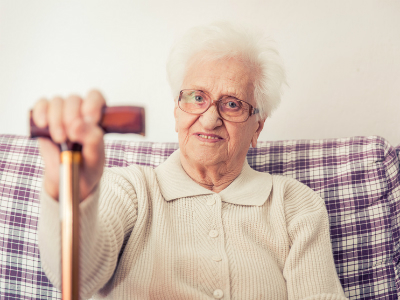
By Susan Dunne
Eileen, 75, has been a resident at a care home for five years and has stayed in her room for most of that time. She has few personal possessions apart from a collection of dog figurines. She becomes visibly distressed if they are moved by the cleaners and insists they are returned to exactly the same place. She watches the same TV programmes every day, turning the TV on at exactly 10.30am and off at 9pm when she goes to bed.
Although she has limited interaction with most of the staff and the activities organiser has long given up trying to persuade her to join in group activities, Eileen knows exactly which staff member will be on at which time of day. She can remember every weekday and exactly what will be on the three-week rotating food menu. If this changes she is liable to become upset.
Misdiagnosis
Until she was 50, Eileen was a long-stay patient at a now closed psychiatric hospital where she was diagnosed with schizophrenia and she continues to be on medication for this. For 10 years before she came to the care home she lived with her older sister who visits Eileen about once a month. Eileen never mentions her sister and there are no family photos in her room.
It wasn’t until Eileen became unwell with a stomach problem that a visiting doctor suggested she might in fact be autistic and that the former catch-all diagnostic label of schizophrenia had been an early attempt to make sense of someone who did not fit neatly into any given category in the mental health field.
Eileen is just one of many older people who may have lived a life with unrecognised autism. The broadening of diagnostic criteria and an increasing recognition that autism is a lifelong condition has led to increased awareness that many older adults might have been wrongly diagnosed, and in consequence, wrongly treated throughout their lives.
Others may have learned to mask autistic symptoms but have lived isolated neglected lives in the community suffering from attendant health and social problems as a result.
Sometimes referred to as the missing or lost generation of autism, it is only now that a larger section of older adults with autism are even beginning to be recognised.
Like Eileen, Edwin, who was diagnosed with autism at 57, has spent a lot of time in the mental health system. The side effects of large amounts of wrongly prescribed anti-psychotic drugs and long periods of institutional care make it difficult to get a clear picture of how autism affects Edwin.
Since being diagnosed he has started attending a day centre for autistic adults, but is older than the other attendees by an average of 30 years. He has no friends and has always depended on his parents who are now in their eighties. Despite wanting to continue caring for him, they are reluctantly facing up to the fact that this may not continue to be possible. Edwin knows his future is uncertain and this fuels his already very high anxiety levels.
Disproportionately dependent
Autism is an isolating condition which can significantly impair the capacity to form relationships. In consequence, ageing adults may be disproportionately dependent on social care as parents and siblings are no longer there to support them. Others who have coped alone may find themselves in need of social care in the absence of partners or friends to rely on.
As a condition which affects one person in 100 in the UK, according to figures from the National Autistic Society (NAS), supporting social care workers to work appropriately with older autistic adults is essential. Yet, according to a Public Health England report, less than a third of councils are confident that all health and social care staff have received even basic autism awareness training despite statutory guidance under the government’s adult autism strategy. Provision of more specialised training to recognise and work with older people with autism is likely to be thin on the ground.
Guidelines in the Department of Health’s A manual for good social work practice: supporting adults with autism, highlight the need for relatives and carers to plan ahead for the eventuality that they may be unable to care for an autistic relative in the long term but say little about working with the specific needs of older adults. However, the manual ends with a recommendation that autism and ageing is a core practice area to consider.
Not on the radar
The NAS policy report Getting on? Growing Older with autism acknowledged that older adults have barely figured on the radar of social care, and research in the area remains negligible compared with that devoted to children and young adults. Francesca Happe, professor of cognitive neuroscience at King’s College London, says research into older people with autism is urgent: “Most people with autism are adults and the elderly with autism spectrum disorder are at risk of suffering a double stigma in today’s society.”
In Eileen’s case, rigid adherence to routines and limited social interaction have sometimes alienated her from staff who see her as demanding and unrewarding to work with. Often her individual needs are subsumed in a homogenised approach which automatically ascribes certain kinds of behaviour to early onset dementia or underlying mental health problems. Staff at the care home have yet to receive any autism specific training.
For older people with autism who become dependent on carers or enter residential care for the first time, decreased control over environmental factors can lead to additional distress. As well as an often rigid reliance on routines and sameness, many people with autism experience heightened sensory sensitivity which can be adversely affected by issues such as noise and lighting. Others may dislike people coming too close and may have atypical communication styles. An individualised approach is essential as everyone will experience autism differently, but even a basic awareness of these factors can significantly impact on the quality of treatment a person experiences.
People like Eileen and Edwin, who have slipped through the diagnostic net for much of their lives, may represent only the tip of the iceberg in terms of older autistic adults who are now reliant on social care.
As a generation in which many have received wrong, inappropriate or no treatment at all, they deserve at least to get the best informed care as they enter old age.
This means moving away from stereotyped views of autism as a disorder of childhood and a recognition that the needs of autistic people will vary across the lifespan. Seeing older people with autism as having a discrete set of needs and concerns within the care system and training staff appropriately will benefit everyone with autism in the long run.
Susan Dunne was diagnosed with autism as a late adult. She has worked extensively across the adult care sector including with adults with autism and writes and talks widely about autism. Her book, A Pony in the Bedroom describes a life journey with undiagnosed autism. You can follow her on Twitter @sueandspot




 Bournemouth, Christchurch and Poole
Bournemouth, Christchurch and Poole  Hampshire County Council
Hampshire County Council  Lincolnshire County Council
Lincolnshire County Council  Norfolk County Council
Norfolk County Council  Northamptonshire Children’s Trust
Northamptonshire Children’s Trust  South Gloucestershire Council
South Gloucestershire Council  Wiltshire Council
Wiltshire Council  Wokingham Borough Council
Wokingham Borough Council  Children and young people with SEND are ‘valued and prioritised’ in Wiltshire, find inspectors
Children and young people with SEND are ‘valued and prioritised’ in Wiltshire, find inspectors  How specialist refugee teams benefit young people and social workers
How specialist refugee teams benefit young people and social workers  Podcast: returning to social work after becoming a first-time parent
Podcast: returning to social work after becoming a first-time parent  Podcast: would you work for an inadequate-rated service?
Podcast: would you work for an inadequate-rated service?  Family help: one local authority’s experience of the model
Family help: one local authority’s experience of the model  Workforce Insights – showcasing a selection of the sector’s top recruiters
Workforce Insights – showcasing a selection of the sector’s top recruiters 

 Facebook
Facebook X
X LinkedIn
LinkedIn Instagram
Instagram
“Until she was 50, Eileen was a long-stay patient at a now closed psychiatric hospital where she was diagnosed with schizophrenia and she continues to be on medication for this.”
Why?! Why do they continue to mistreat her when they know she is not schizophrenic?!
The drugs keep her quiet